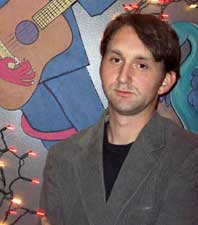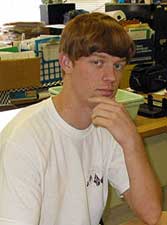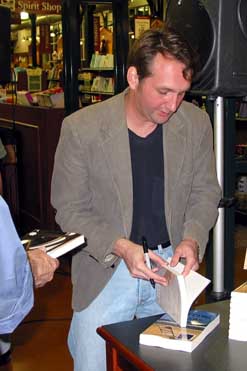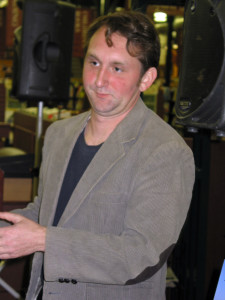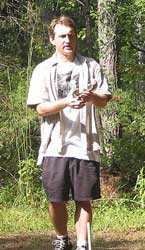Major Works
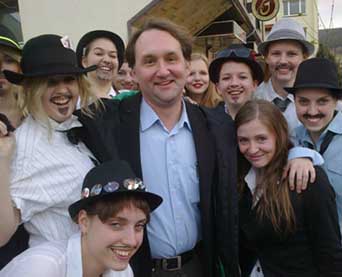
Photo used by permission: Brad Vice with high school students he visited for an American Culture celebration in the Czech Republic in 2013. They were working on their graduation ball dances with gangsters and showgirls as the theme
Short Stories
- “Report From Junction“
- “Chickensnake” selected by Joyce Carol Oates for inclusion in the Best New American Voices, 2002 anthology
- “Stalin“
- “Mojo Farmer“
- “Artifacts” in Stories of the Blue Moon Cafe III
Collections of Short Stories
- The Bear Bryant Funeral Train and Other Stories (Oct 10, 2005) Winner of the Flannery O’Connor Award which was later rescinded–see below), published by the University of Georgia Press
- The Bear Bryant Funeral Train: Stories, River City Publishing, 2007
Brad Vice: A Biography
by Matt Kunz (SHS) 2004
Author Brad Vice was born November 14, 1973 in Tuscaloosa, Alabama, and raised in Northport, Alabama, but he moved to Starkville, Mississippi (See update below), where he taught creative writing at Mississippi State University. His father Leon Vice was a high school history teacher and a farmer, and his mother Dorothy, a retired radiology technician As a child, Vice’s summers were spent working on his grandparents’ cattle farm and reading. He attended the University of Alabama after high school and received his BA in 1994. In 1997 he got his masters from the University of Tennessee and later a doctorate from the University of Cincinnati. In 2001, he earned his Ph.D. from the University of Cincinnati. In 2001, before coming to MSU, he was Assistant Professor of English at Arkansas Tech University where his ex-wife Julian Gray also taught.
Vice has had stories published in many journals and magazines such as The Atlantic Monthly, The Southern Review, The Greensboro Review, The Georgia Review, Hayden’s Ferry Review, and The Carolina Quarterly. He has also had stories published in New Stories from the South 1997 and Best New American Voices 2003. Stories from the Blue Moon Cafe III also contains a short story by him. In addition, Brad Vice has been writing book reviews for the San Francisco Chronicle.
Vice’s book of short stories called The Bear Bryant Funeral Train and Other Stories, published in the fall of 2005, was named the winner of the Flannery O’Connor Award for Short Fiction, but the award was later rescinded.
The University of Georgia Press learned that one story in The Bear Bryant Funeral Train included material written by Carl Carmer, and Brad Vice was accused of plagiarism, had his award revoked, and had the unsold copies of his book destroyed. However, there were numerous writers and editors who defended him. Jake Adam York, a poet and editor of the Alabama literary journal called Thicket, stated that Vice had allowed his short story and the four-page section of Carmer’s original book to be published side by side in Thicket. This process by Vice, according to York, “implicitly acknowledges the relationship (and) allows the evidence to be made public.” York considers that what Vice was doing with his story was “allusion, not plagiarism.” According to York’s analysis of Vice’s story and Carmer’s source material, Vice did not break copyright law. As a result of the controversy, however, Brad Vice lost his job at Mississippi State University despite the fact that he had the support of his English Department head, Dr. Rich Raymond and many others.
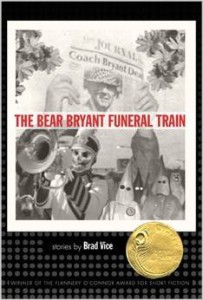 A new edition of the book of short stories was published in 2007 by River City Publishing as The Bear Bryant Funeral Train: Stories. The new version is divided into two sections: Part One: ‘Stalin’ and Other Children’s Stories, and Part Two: The Bear Bryant Funeral Train. It also contains an additional story Demopolis with an introduction written by Vice. The book ends with commentary by four writers who deal with the controversy surrounding Vice’s first publication.
A new edition of the book of short stories was published in 2007 by River City Publishing as The Bear Bryant Funeral Train: Stories. The new version is divided into two sections: Part One: ‘Stalin’ and Other Children’s Stories, and Part Two: The Bear Bryant Funeral Train. It also contains an additional story Demopolis with an introduction written by Vice. The book ends with commentary by four writers who deal with the controversy surrounding Vice’s first publication.
The Atlantic Monthly, The Georgia Review, The Southern Review, The Greensboro Review, and Shenandoah have published his work. His short story Mojo Farmer was selected for inclusion in the 1997 edition of New Stories From the South, and his story Report from Junction was included in the anthology’s 2003 edition. Best New American Voices included his story Chickensnake in the 2003 edition. He has also written reviews of fiction for a number of magazines and newspapers.
Since 2007, Brad Vice has taught at the University of West Bohemia’s ISLS International Summer Language School, and in 2010 he began teaching at the Prague Literary Academy of Josef Škvorecký as an international lecturer. He currently lives in Pilzen, Czech Republic.
Reviews
A Review of “Report from Junction“
by Matt Kuntz (SHS)
“Report From Junction” is a short story by Brad Vice about Kurt Schaffer, a young man who lives in Blanco, Texas. The year is 1954, and Texas has been going through four straight years of drought. Since his father owns a cattle ranch and his uncle a feedstore, the drought is personally affecting him and his family.
“Report From Junction” is mainly about the hard times Kurt is going through. Although he has been offered a football scholarship to Texas A&M, that is all he has to look forward to. There is a small training camp in Junction, Texas, where the A & M team practices. Everyday the newspapers have daily reports from Junction. Paul “Bear” Bryant is the coach, and lots of football players have quit because it is so strenuous. Kurt receives some excitement one day when someone shows up at his uncle’s feed store. I am not going to give away anything, but that part is exciting. The ending of “Report from Junction” is not what I was expecting, but it is a good ending. I can relate to Kurt, and as I read, I felt a bond with that character.
In this short story, Vice does an excellent job of showing the emotions, feelings, and thoughts of young Kurt. Overall, this story is very good and left me wanting to know more since the ending allows you to make your own conclusions about what happens in the future. I strongly recommend reading this short story.
Interview with Brad Vice, 1999
by Matt Kunz (SHS)
When were you born? Who are your parents? Are you married?
I was born in Tuscaloosa in 1973 and raised across the river in Northport, Alabama. My father was Leon Vice, a high school history teacher and a farmer. My mother, Dorothy, was a radiology technician. My dad passed away three years ago. My mom is retired and cares for my grandmother. I’m not married.
What do you remember from your childhood that has made a lasting impression on you as a person or a writer?
I just remember looking at how hard my parents worked and thinking, these people are crazy. Why are they killing themselves? Why can’t they relax and take it easy? Now I know how hard it is to get what you want in life. At some point I realized if I wanted to be a writer I was going to have to work at it, work and work hard.
When did you know you wanted to be a writer? Was there something in particular that got you interested in writing?
I was an only child and didn’t have many playmates. I spent a lot of time on my grandparents’ farm with few other children around. I read a lot as a kid, though it took me a long time to learn to read. By third grade I could read Hardy Boys’ mysteries. By the fourth I had read Watership Down and C.S. Lewis. By fifth it was Tolkien and Stephen King. By the fifth grade I knew I wanted to be a writer, though I wrote stories at school even before then.
How difficult was it for you to get your forthcoming book of short stories published? How did you go about it?
Well, my agent tried all the commercial presses a couple years ago and none of them were interested. But the manuscript that won the Flannery O’ Connor Award is a better book than the one she submitted to the big houses. I wrote two new stories in that time. I dropped a weaker story and strengthened the old ones. It took me over ten years to write this book. I’ve been trying to get it published in one form or another since 2001. But I’m glad it took until now to get it published. It simply wasn’t ready.
Do you base some of your short stories, even though fiction, on your own life? Could you explain? Do you base the characters in the short stories on people you know or knew?
Sure. But everything you see, do, read is part of your life. When you read a memoir, somehow other people’s memories become part of your life.
I have had this strange experience of writing fiction, and then looking back on a character a year or two later and finding myself inside a character. Sometimes I write about me and don’t even know it. Usually characters that are sullen and resentful turn out to be me. If someone does something noble or heroic, I’m probably writing about my dad. Sometimes a character is capable of both, and thus through the magic of fiction we become the same person.
Who is/are your favorite author/authors?
Off the top of my head: Flannery O’Connor and Walker Percy. Friends and teachers: Barry Hannah, Brad Watson, William Gay, Tom Franklin, Brock Clarke, Michael Griffith, Margot Livsey, Erin McGraw, Claire Messud, Tim Parrish. Thanks to Percy, I’m on a Dostoyevsky kick right now.
What author or person do you think has influenced you the most?
Well, I’ve read every word Barry Hannah has in print. He is a hero, a teacher, and a friend, so I guess he has influenced me in more varied ways than any other writer. He was the first contemporary writer that captured my imagination. His book Ray was set in Tuscaloosa. Suddenly my hometown was transformed in my estimation to a place worthy of literary significance. This is a process Walker Percy calls “certification.” I collected Hannah’s books the way kids collect comics and reread them obsessively. When I became one of his students at the Sewanee Writers’ Conference, I was very nervous. My story was a 30 page Barry Hannah imitation. And by the time we had our conference, I knew it and I was embarrassed. But he was such a gent. At some point I figured out, I had to be my own person. I couldn’t imitate Hannah’s style, nobody can. Walker Percy’s The Moviegoer has probably had the greatest influence on my sensibilities and my prose style. These days I verge toward wistful melancholy over gonzo exuberance. Though both Hannah and Percy are capable of mixing these two moods. Maybe that’s what I like about them.
What kind of student were you in high school?
Good. I thought I was a lot smarter than I was. I hit a wall as a junior and I become overwhelmed with all the AP classes I selected for myself. I had solid grades, but I didn’t graduate anywhere near the top of my class. It was heartbreaking to discover I wasn’t a genius.
What are you working on currently?
I’m still revising my collection, and I’m working on a novel. The novel is slow going and I think I may abandon it. We’ll see.
When did you move to Mississippi, and how long have you lived here?
I moved here in 2002.
How do you think living in Mississippi will influence your writing?
Mississippi is a lot more wild than Alabama. It seems to be less bourgeois. Lots of poor people and lots of rich people, which breeds a kind of hell-for-leather decadence I enjoy observing. Who knows, maybe I’m just less sheltered now. On the other hand, I live only an hour away from my family farm in Lamar County Alabama. The culture here in my part of North East Mississippi is pretty much the same as it was growing up in North West Alabama. In that sense, I feel I have simply moved home.
Besides writing, what else do you like to do?
I play guitar when I need a distraction. I run to stay in shape. Other than that I am completely unencumbered by hobbies.
Do you have any advice for students who might want to be writers someday?
Get started now. Don’t wait to write. Nothing’s going to happen to you that will make you a writer. Only writing will make you a writer. It will probably take ten or more years for you to develop. started seriously at 18. I’m 30 now. I think if I’d started seriously at 15, I’d be a lot more accomplished. On the other hand, many writers don’t start until much later: Larry Brown, Carol Shields, Ellen Gilchrist. Daniel Defoe was in his 50’s. It’s never too late. I spent most of my twenties cloistered in a library or bathed in the dim glow of a computer screen. For the next decade, I’m planning on doing a little more living.
Related Websites
- “The Literary Lynching of Brad Vice” by Jason Sanford in story South.com 2005)
- Review of William Trevor’s A Bit on the Side by Brad Vice in San Francisco Chronicle, Oct. 17, 2004.
- Plagiarism charge clouds a new writer’s futureby David Milofsky, Jan. 1, 2006 in Denver Post.
- How to Feed the Monster, an essay by Barrett Hathcock in The Quarterly Conversation, 2008.
- Revenge, ego and the corruption of Wikipedia by Andrew Leonard is a staff writer at Salon.com.

